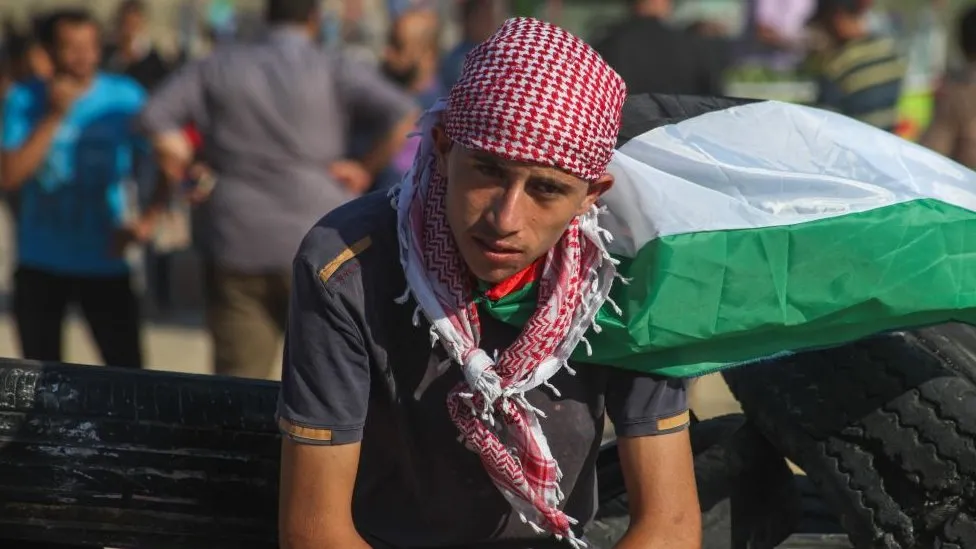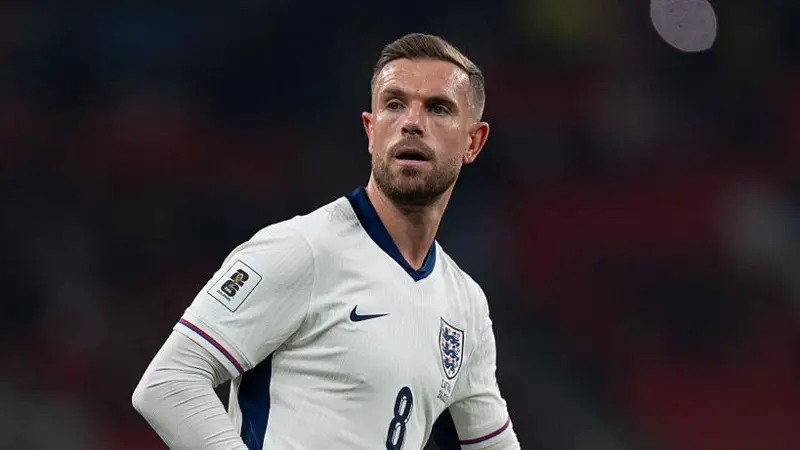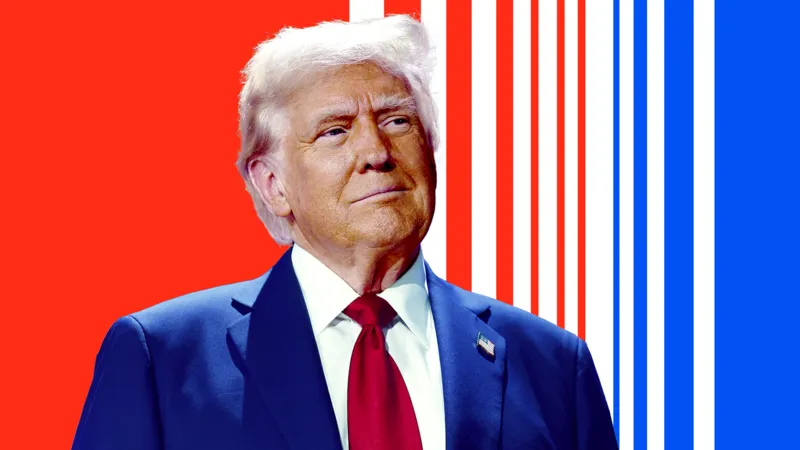'As Palestinian youths, the political process has failed us'
Palestinians under the age of 30 have never had a chance to vote in an election and many say they have little faith in the Palestinian leadership. Exclusive data shared with the BBC suggests they are increasingly rejecting the idea of a two-state solution to the Israeli-Palestinian conflict.

"The very clichéd 'two-state solution' - Western-made, without looking at the real situation," 17-year-old Janna Tamimi responds disparagingly when asked about it, adding: "But where are the borders?"
Janna says she is one of the youngest accredited journalists in the world. At the age of seven she began borrowing her mother's phone and covering protests in her hometown of Nabi Salah in the occupied West Bank.
"I've been reporting the [Israeli forces'] night raids and the day raids that happen pretty often. I don't film all of them, but I try my best. It's been a bit hard with school and everything. But there's always something to cover."
Since Janna was born there has not been a single general or presidential election in the Palestinian territories. The last one took place in 2006, which means anyone under 34 years old has never had the opportunity to vote.
What has followed is a collapse of trust in the Palestinian political leadership and a downward spiral of support for the two-state solution, the internationally backed formula for peace envisaging an independent Palestinian state alongside Israel.
The West Bank-based Palestinian Center for Policy and Survey Research has tracked the changing views of the population for over two decades and has shared data exclusively with the BBC on 18 to 29-year-olds.
The findings demonstrate clear trends in this generation's declining support for the governing Palestinian Authority (PA) and a consistent drop in support for a two-state solution over the last decade.
"Today, the youth discontent is driven to a large extent by the lack of legitimacy that they see in the political system. So we have a president, who, for the last 14 years has been ruling without electoral legitimacy," explains Dr Khalil Shikaki, the director of the centre.
"Our political system is largely authoritarian; it is largely a one-man show. In theory, we have a constitution, but in reality, we're not observing our constitution."
At the same time, support for armed confrontation is highest amongst under 30-year-olds, with over 56% supporting a return to an intifada, or uprising, against Israel, according to the most recent poll in March.
In the past year, numerous new militant groups have sprung up in the northern West Bank towns of Nablus and Jenin, challenging the legitimacy of the Palestinian Authority's security forces.
The most well-known are the Lions' Den and the Jenin Brigades, which have carried out attacks in the West Bank against Israeli forces and settlers.
We join the Jenin Brigades at 02:00 one night as they carry out training exercises in the labyrinthine streets of the Jenin refugee camp.
Each member is armed with an M16 assault rifle and dressed head to toe in black as they silently make their way in a single line formation. Their guns point forward scanning alleys and rooftops as they move.
Mostly men in their 20s, these fighters claim to be independent of major militant groups and have publicly rejected links to political parties in the Palestinian territories.
One of the fighters, Mujahed, 28, tells us that his generation is not represented by the current leadership.
"The youth of Palestine have lost hope with the political methods of the past 30 years," he says.
Does he support violence as a solution?
"This occupation enters here daily and kills in cold blood, in broad daylight," he says, referring to Israeli forces. "This occupation only understands the language of force."
Political temperature
In the absence of a general or presidential election, the student elections in universities are a barometer of the political temperature. Birzeit University in the West Bank and its student elections are widely regarded as a reflection of the political mood in the territories.
The change of sentiments is evident here too. The student Fatah party, the youth wing of the dominant party in the Palestinian Authority, has always held out against opposition Islamist parties, including Fatah's main rival Hamas. But that changed last year.
"It was a shock," explains Mustafa, a student representative for the Democratic Front for the Liberation of Palestine party that also stood in the 2022 student elections.
"Usually, the difference between Fatah and the Hamas factions is one or two seats. This time it was 10 for Hamas."
The unprecedented landslide win for Hamas in these student elections is largely seen as a protest against the Palestinian Authority, a feat which was repeated last month, albeit with a slightly reduced majority.
"Of course, if there were general elections, they would yield the same results as the ones in Birzeit," Mustafa continues, "because people are fed up with the way the Palestinian Authority is dealing with things, whether it is political detentions, taxes, killings or the smothering of freedom of expression".
'Fig leaf'
For many who have grown up with no voice in the future of the Palestinian territories, it has raised questions about identity.
Majd Nasrallah works as a curator at the Qattan Foundation, an independent organisation working in culture and education. He is based in the West Bank city of Ramallah but was born in a town situated in northern Israel.
Palestinian citizens make up 20% of Israel's population and like many in his generation he prefers to identify as "from '48" - a term that describes Palestinians who remained in the land which became Israel following its creation in 1948. As a result, he finds himself excluded from Palestinian society.
"I'm not recognised as part of the Palestinian system in the West Bank," Majd continues. "I'm not supposed to vote [in Palestinian elections]. Actually, according to Israeli law, I'm not even supposed to be here [in Ramallah]."
Israeli law prohibits citizens from travelling to Palestinian areas in the West Bank for security reasons.
Without a voice in the Palestinian political process, Majd also has no faith in the two-state solution.
"The two-state solution is really a corpse of a political project that is usually used as a fig leaf for the continued oppression of Palestinians," he says.
"It's not about a state, if you ask me. A five-year-old can take a look at the map and tell you that this doesn't work."
The future of a two-state solution is in question if a generation who have most at stake in it are increasingly rejecting it as a viable option.
I ask Majd what he could imagine hoping for.
"For the longest time, I was an advocate for the 'one democratic state' solution [encompassing Israel and the Palestinian territories]," he says. "Over at least the last decade, there have been so many attempts to voice our discontent with this current form of governance, which have been completely repressed. I can say with a full heart, the PA does not represent the voice of not only my generation, but Palestinians at large."
The Palestinian Authority did not respond to a request for a reply to issues raised in this article.
-bbc






